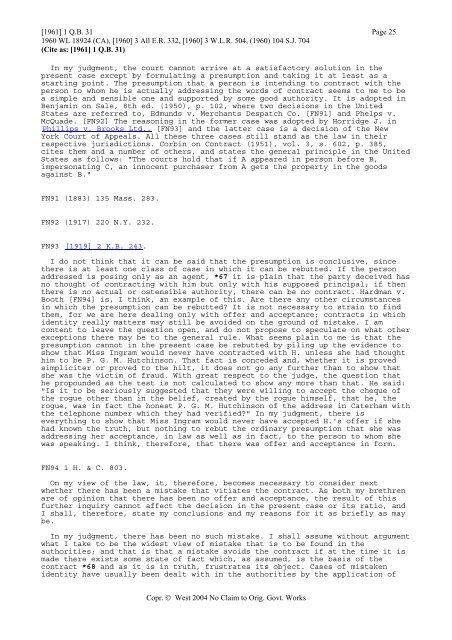Tesco v Constain - Thomson Reuters
Tesco v Constain - Thomson Reuters
Tesco v Constain - Thomson Reuters
Create successful ePaper yourself
Turn your PDF publications into a flip-book with our unique Google optimized e-Paper software.
[1961] 1 Q.B. 31 Page 251960 WL 18924 (CA), [1960] 3 All E.R. 332, [1960] 3 W.L.R. 504, (1960) 104 S.J. 704(Cite as: [1961] 1 Q.B. 31)In my judgment, the court cannot arrive at a satisfactory solution in thepresent case except by formulating a presumption and taking it at least as astarting point. The presumption that a person is intending to contract with theperson to whom he is actually addressing the words of contract seems to me to bea simple and sensible one and supported by some good authority. It is adopted inBenjamin on Sale, 8th ed. (1950), p. 102, where two decisions in the UnitedStates are referred to, Edmunds v. Merchants Despatch Co. [FN91] and Phelps v.McQuade. [FN92] The reasoning in the former case was adopted by Horridge J. inHPhillips v. Brooks Ltd., [FN93] and the latter case is a decision of the NewYork Court of Appeals. All these three cases still stand as the law in theirrespective jurisdictions. Corbin on Contract (1951), vol. 3, s. 602, p. 385,cites them and a number of others, and states the general principle in the UnitedStates as follows: "The courts hold that if A appeared in person before B,impersonating C, an innocent purchaser from A gets the property in the goodsagainst B."FN91 (1883) 135 Mass. 283.FN92 (1917) 220 N.Y. 232.FN93 H[1919] 2 K.B. 243.I do not think that it can be said that the presumption is conclusive, sincethere is at least one class of case in which it can be rebutted. If the personaddressed is posing only as an agent, *67 it is plain that the party deceived hasno thought of contracting with him but only with his supposed principal; if thenthere is no actual or ostensible authority, there can be no contract. Hardman v.Booth [FN94] is, I think, an example of this. Are there any other circumstancesin which the presumption can be rebutted? It is not necessary to strain to findthem, for we are here dealing only with offer and acceptance; contracts in whichidentity really matters may still be avoided on the ground of mistake. I amcontent to leave the question open, and do not propose to speculate on what otherexceptions there may be to the general rule. What seems plain to me is that thepresumption cannot in the present case be rebutted by piling up the evidence toshow that Miss Ingram would never have contracted with H. unless she had thoughthim to be P. G. M. Hutchinson. That fact is conceded and, whether it is provedsimpliciter or proved to the hilt, it does not go any further than to show thatshe was the victim of fraud. With great respect to the judge, the question thathe propounded as the test is not calculated to show any more than that. He said:"Is it to be seriously suggested that they were willing to accept the cheque ofthe rogue other than in the belief, created by the rogue himself, that he, therogue, was in fact the honest P. G. M. Hutchinson of the address in Caterham withthe telephone number which they had verified?" In my judgment, there iseverything to show that Miss Ingram would never have accepted H.'s offer if shehad known the truth, but nothing to rebut the ordinary presumption that she wasaddressing her acceptance, in law as well as in fact, to the person to whom shewas speaking. I think, therefore, that there was offer and acceptance in form.FN94 1 H. & C. 803.On my view of the law, it, therefore, becomes necessary to consider nextwhether there has been a mistake that vitiates the contract. As both my brethrenare of opinion that there has been no offer and acceptance, the result of thisfurther inquiry cannot affect the decision in the present case or its ratio, andI shall, therefore, state my conclusions and my reasons for it as briefly as maybe.In my judgment, there has been no such mistake. I shall assume without argumentwhat I take to be the widest view of mistake that is to be found in theauthorities; and that is that a mistake avoids the contract if at the time it ismade there exists some state of fact which, as assumed, is the basis of thecontract *68 and as it is in truth, frustrates its object. Cases of mistakenidentity have usually been dealt with in the authorities by the application ofCopr. © West 2004 No Claim to Orig. Govt. Works
















